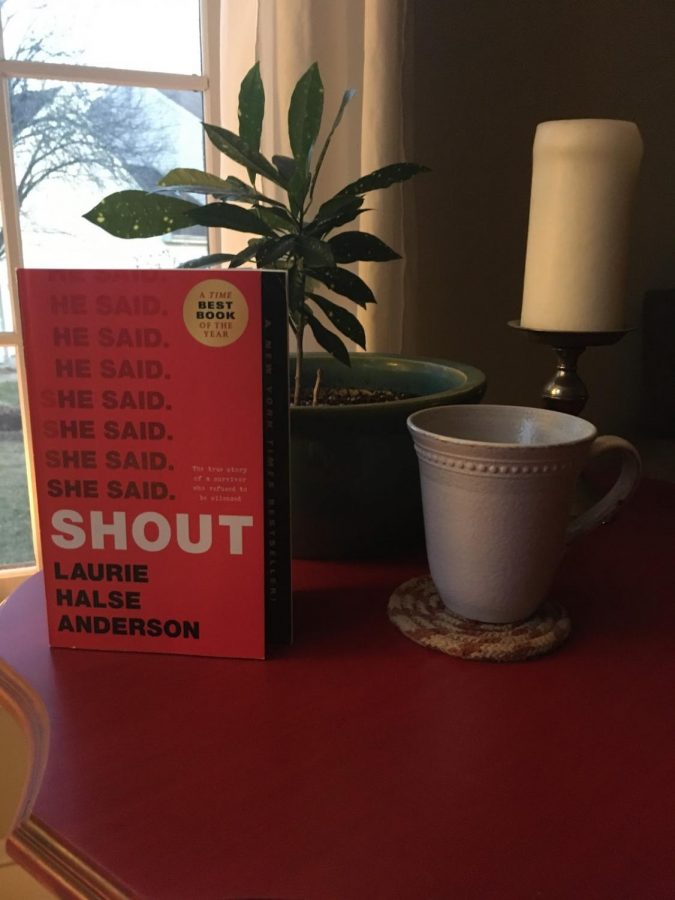“SHOUT” : Author of “Speak” returns with a riveting new novel
February 3, 2021
Ten years after the publication of her renowned work “Speak”, a novel about a 14-year-old girl entering highschool after being brutally raped over the summer, Laurie Halse Anderson wrote her poetic memoir “SHOUT” in March of 2019. In the memoir, she reveals her own experiences with sexual assault that inspired her to write “Speak”.
Anderson unabashedly explores the uncomfortable topics of rape, drugs, censorship, gender roles, deplorable authority figures, and troubled households that as a society, we’d rather ignore than address. What sets Anderson apart from other authors of her time is her candidness as she, in her own words, advocates for “the kids the world doesn’t want to see.”
Of the many themes addressed in the memoir, Anderson manages to artistically tackle issues applicable to teenagers such as body issues, feeling out of place, failing classes, experimenting with drugs, alcohol, and sex. One of the most beautiful aspects of this work is the fact that Anderson addresses her own faults instead of just preaching moral values to youth, which forges a more intimate connection between her words and the reader. This isn’t another example of an adult employing fear tactics in an attempt to prevent teenagers from engaging in activities that they wouldn’t want to list as an extracurricular.
As a result of the trauma inflicted from her rape at the age of 13, Anderson searched for various ways to distract herself, including coping mechanisms like alcohol and marijuana. If it hadn’t been for a gym teacher who noticed her larger stature, Anderson wouldn’t have ended up digging herself out of her depression or developing better alternatives to fill the emptiness inside of her. Joining the swim team and track gave Anderson a reason to save herself from wasting away instead of waiting for someone else to mend her broken pieces.
The poetry itself and the story she tells through it is filled with humor, snark, vulnerability, and tenderness that demonstrates her sensitivity towards these issues while also refusing to stay silent or dilute the harsh reality of these circumstances. At the start of her career, because Anderson explored these topics that some considered controversial and inappropriate for students, her books were hidden from her intended audience as mentioned in her poem “Inappropriate Dictators”.
More prominently, Anderson channels her anger towards blatant censorship in her poem “Emergency, in Three Acts”. After the publication of “Speak”, she was invited to talk at a school in New Jersey. While Anderson was advocating for victims of sexual assault and discussing what consent actually meant, the principal decided to pull the fire alarm as a means of shutting her up because he believed her message was ill-suited for his student body. It’s one of the many poems that touches on the belief of invincibility that tethers our communities together because rape couldn’t occur here. Victims of domestic violence, of drug abuse, of assault couldn’t possibly exist in this area. Those ‘things’ don’t happen here. Ironically, the principal believed those statements to be true, when in fact, as Anderson stood outside she was met by various teenage girls who could relate to Anderson’s experience.
Most importantly, Anderson confronts both sides of the equation as she advocates for all victims, male and female, as seen in the poem “Wired Together”. During the shooting of the film adaptation “Speak”, Anderson encountered one of the crew members who told her he was a Melinda, meaning he was a sexual assault survivor. In fact, he informed her that many of the people working on this project were also victims of sexual assault. These stories hardly scrape the surface of the contents within “SHOUT”.
In all honesty, as a reader, I’m the last to purchase autobiographies documenting someone else’s experiences, offering advice on how to live life and overcome everyday obstacles. To me, there is a fine line between coming across as self-righteous and egotistical and being relatable and helpful. I lose my interest as a reader when authors come across as narrow-minded and when they don’t allow room for open discussion about the topics they are writing about. Because of this, “SHOUT” had a far greater impact on me as a reader than I anticipated. This book made me feel so impassioned and overwhelmed with a rage at the injustices of the world that it inspires me to become more of an advocate in my own community. The numerous themes allow for everyone to find at least one poem within her memoir to relate to; whether it’s sexual assault or harassment, gender expectations, estranged parents, or just slipping between the cracks, Anderson highlights all of the trauma and conflicts humanity faces.
It is Anderson’s unapologetic rawness that leaves the reader overcome with emotion, consequently forcing the book to be more than just a retelling of the pivotal events in a stranger’s life. “SHOUT” is a book that belongs on everyone’s bookshelf for both readers and nonreaders alike.












